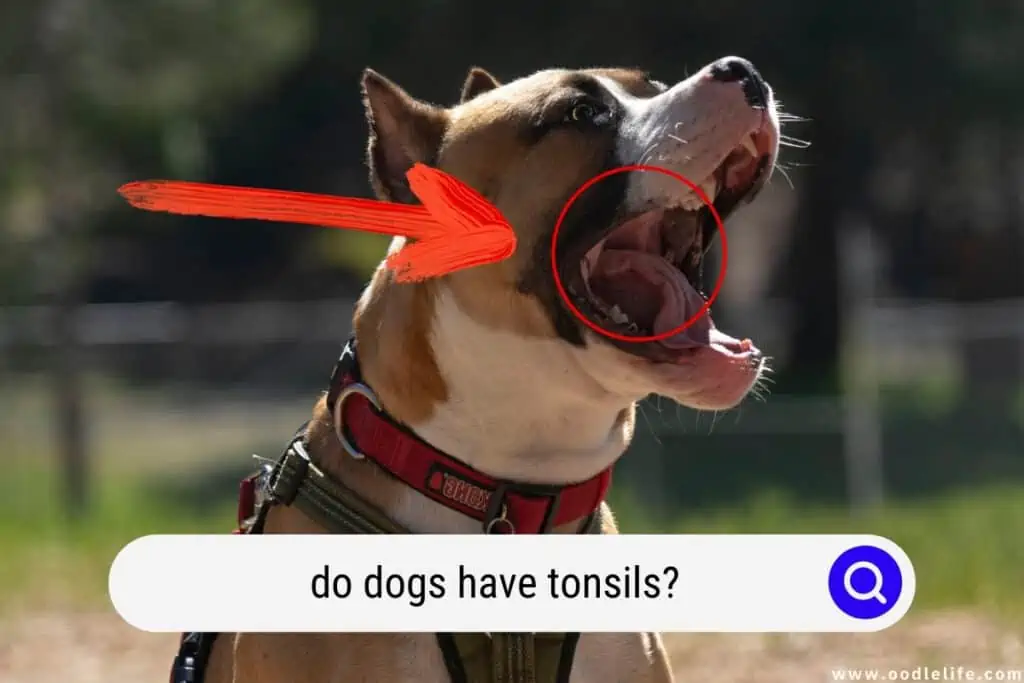Do Dogs Have Tonsils? Can They Get Tonsillitis?
Tonsils play a critical role in preventing bacteria and viruses that enter the mouth/nose from getting into the lungs. While they’re part of the immune system, tonsils can sometimes be troublesome.
If you’ve ever had tonsillitis, you can tell how painful it is. You experience a sore throat, trouble swallowing, a stiff neck, and a scratchy voice. What if you realize your dog has similar symptoms?

The first question that will come into your mind is, do dogs have tonsils?
If you fear that your dog has tonsillitis, this article has got you covered. Herein are scientific truths about tonsils and tonsillitis in dogs.
Do Dogs Have Tonsils?
Dogs have tonsils, which are part of their lymphatic system. Like humans, dogs’ tonsils exist as a pair at the back of their throats.
Tonsils in dogs are highly effective in ensuring no germs find their way into the lungs. Tonsils in dogs are more effective than in humans. However, if your dog is battling an infection, its tonsils might expand and cause various degrees of discomfort.
Now you have the answer to whether dogs have tonsils. With tonsils, dogs can also get tonsillitis. So, how do you know your dog has tonsillitis?

How Do You Detect Tonsillitis in a Dog?
Tonsillitis in dogs results from mouth, nose, pharynx, or lung disorders. Other dogs get tonsillitis due to chronic vomiting, coughing, and certain cancers.
When you open your dog’s mouth, you can easily detect tonsillitis by shining a light on the back of its throat. Infected tonsils will appear red and swollen.
Apart from inspecting the dog’s throat, you can rely on the following symptoms to detect whether your dog suffers from tonsillitis.
- Reluctance to eat: When tonsils swell due to an infection, they are usually painful. Affected dogs will avoid food because swallowing is painful and difficult.
- Gagging: Like in humans, enlarged tonsils in dogs might cause great discomfort. Often, your dog will gag in an attempt to swallow something that feels stuck in the throat.
- Salivation: If tonsillitis is severe, your dog will experience difficulty swallowing anything, including saliva. As a result, your dog will drool excessively.
Other symptoms include coughing, listlessness, licking lips, and sometimes fever.

Is Tonsillitis Common in Dogs?
Dogs, unlike humans, rarely get tonsillitis because their tonsils are highly effective, and in case of viral or bacterial attacks, they rarely get infected.
If your dog has tonsillitis, it’s usually due to a secondary cause. That means your dog is suffering from other diseases affecting the mouth, nose, or throat.
Dogs that are more susceptible to tonsillitis are the smaller brachycephalic breeds. These breeds include:
- Pugs
- English Bulldogs
- French Bulldogs
- Chow Chows
- Chihuahuas
- Pekingese

Can I Get Tonsillitis From My Dog?
Tonsillitis in dogs is not contagious. Bacteria and viruses in your dog’s mouth are the primary causes of tonsillitis. However, be wary of your dog’s tonsillitis if it results from secondary diseases.

What Are the Causes of Tonsillitis in Dogs?
If your dog has a disorder in its mouth, nose, or upper throat, it may suffer from tonsillitis. Bacteria and viruses are the major causes of the disorders. These bacteria and viruses result from poor dental hygiene.
If tartar and bacteria accumulate on your dog’s teeth, they may lead to gum or tooth infection. The infection might spread from the mouth to the tonsils.
Other disorders that may result in tonsillitis include frequent coughing and vomiting. In unfortunate situations, your dog might be suffering from certain oral, nasal, or throat cancers that can spread to the tonsils.

How To Diagnose Tonsillitis in Your Dog?
If your dog has symptoms, it’s advisable to seek the help of your veterinarian for diagnosis. The diagnosis involves examining your dog and asking you questions about the symptoms you have seen. Be sure to provide your dog’s history so the vet can diagnose the illness fast.
The vet will examine inflamed palatine tonsils that are easy to identify due to their swelling and redness.
Diagnosing the problem is one thing. Failing to unearth the root cause of the problem will not help in the long run. If your dog’s tonsillitis results from a disorder, your vet should find a cure for that disorder to avoid the recurrence of tonsillitis.
That’s why it’s essential to provide any symptoms you’ve seen in your dog for the vet to conduct an adequate diagnosis. Discuss your dog’s behaviors such as vomiting, lost appetite, and coughing.
Such symptoms will help the vet identify the primary infection. It will also inform the veterinarian on whether to conduct tests like dental radiographs, x-rays, and complete blood count.

How To Treat Tonsillitis in My Dog?
Tonsillitis in your dog results from secondary causes. The best way to treat tonsillitis in dogs is by treating the underlying issue first. After diagnosing the primary cause, your vet will seek to treat it first and then provide other medications to help reduce pain and swelling.
Since most dogs suffer from tonsillitis due to bacterial or viral infection, the vet will prescribe antibiotics that your dog will take for up to 15 days.
The veterinarian may also advise you to take care of your dog’s oral health by ensuring its teeth are clean. A change of diet may also solve the problem. Oral health may necessitate professional dental or gum cure, extraction, or teeth cleaning.
Failure to treat a dental or gum disease won’t help eliminate tonsillitis in dogs.
If tonsillitis persists even after using antibiotics, your vet may recommend further tests such as bacteria culture and sensitivity testing.
Such tests will help the vet determine better treatment alternatives. Your vet will also recommend anti-inflammatory drugs and a pain reliever to reduce swelling and pain. Some of the most effective anti-inflammatory drugs and pain relievers include:
- Rimadyl
- Deramaxx
- Metacam
- Previcox
What if your vet discovers that your dog has a foreign object lodged in its throat? The vet will remove it, examine the damage and prescribe the right antibiotics and pain relievers.
If tonsillitis results from coughing or vomiting, the vet can recommend a cough suppressant or anti-emetic drug.

Is Tonsillectomy Necessary for Dogs?
Tonsillectomy is the removal of tonsils through surgery. Most vets won’t recommend tonsillectomy because of the tonsils’ role in your dog’s immunity. Tonsils fight any infections in the mouth, nose, or throat.
By removing tonsils, bacteria and viruses will easily find their way into the lungs, causing severe illnesses.
However, if your dog has recurrent tonsillitis, your vet might recommend a tonsillectomy. Smaller brachycephalic breeds are susceptible to recurrent tonsillitis and might need to undergo this process.
What if your dog is not responding to various tonsillitis treatments? Instead of seeing your dog suffer, you may decide to get its tonsils removed.
Ensure your dog is healthy and takes the recommended diet. Additionally, you can take it for regular checkups to ensure there are no developing disorders.

What Do I Feed My Dog Healing From Tonsillitis?
During the tonsillitis healing process, it’s advisable to change your dog’s diet. Solid food may irritate the healing tonsils or throat and cause pain and discomfort. The best way to keep your dog up and running is by feeding it soft food that’s easy to swallow.
Keep your dog hydrated by feeding it plenty of fluids. Whether it’s water or Pedialyte, hydrating your furry friend will keep it strong and help it to heal faster. After full recovery, you can feed your dog its favorite dog meal and treats.

Final Thoughts
We hope you now have the answer to the question, do dogs have tonsils? Dogs’ tonsils, like in humans, can get affected by tonsillitis. Since tonsils are vital organs in your dog, it’s important to take your dog to the vet when you detect tonsillitis symptoms.
Also, remember to maintain your dog’s dental health by cleaning its teeth often and feeding it adequate and healthy dog food.